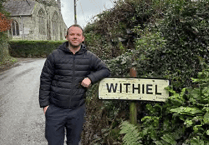A RESIDENTIAL development comprising 170 dwellings is set to be builton land to the north of Bodmin after Cornwall Council’s planners gave the development the green light.
Westcountry Land (Bodmin) Limited applied to Cornwall Council in 2020 for the development, comprising the 170 dwellings on land on Castle Street, near the Callywith College further education college.
30% of the allocated site is set to comprise affordable housing, with a tenure split of 68.6% affordable rent and 31.4% shared ownership or intermediate sale.
Bodmin Town Council issued strong objections to the proposals, saying that while they were not against the development, needed reassurance and commitment that suitable infrastructure plans were being put in place.
In its initial objection, Bodmin Town Council said: “It was RESOLVED by the Bodmin Town Council Planning Committee in line with the previous resolution to object to the planning application PA20/07691 and call it to Eastern Strategic Planning for consideration.
Bodmin Town Council cite the following rationale: Cornwall Council have not provided the strategic upgrade for Launceston Road and Callywith Gate to mitigate against the impact of growth; improve conditions for pedestrians and cyclists and open up land for development as detailed in the Cornwall Council Development Plan Document.
Bodmin Town Council also cite Section 109 of the National Planning Policy Framework which states: ‘Development should only be prevented or refused on highways grounds if there would be an unacceptable impact on highway safety, or the residual cumulative impacts on the road network would be severe.'
Bodmin Town Council also refer to Section 110 National Planning Framework Policy: “Within this context, applications for development should: a) give priority first to pedestrian and cycle movements, both within the scheme and with neighbouring areas; and second ‘so far as possible’ facilitating access to high quality public transport, with layouts that maximise the catchment area for bus or other public transport services, and appropriate facilities that encourage public transport use; b) address the needs of people with disabilities and reduced mobility in relation to all modes of transport; c) create places that are safe, secure and attractive ‘ which minimise the scope for conflicts between pedestrians, cyclists and vehicles, avoid unnecessary street clutter, and respond to local character and design standards; d) allow for the efficient delivery of goods, and access by service and emergency vehicles’
“Also, Cornwall Council have not given credence to their own policy as stated in the Place Shaping Community Toolkit, in particular key infrastructure,” it added.
In a later addendum to the objection, Peter Martin, the town clerk of Bodmin Town Council added: “The Planning Committee do not feel their concerns and questions have been answered by Cornwall Council Planning and whilst not against the development need reassurance and commitment that suitable infrastructure plans are being put in place. It was proposed that the Town Clerk resend his letter to Robert Jenrick Secretary of State for Housing and ask why he has had no response and copy in The Chief Executive of Cornwall Council.”
There were also six objections to the proposals from residents of the area, citing access and drainage concerns. However, Cornwall Council gave the scheme the go-ahead subject to a number of conditions relating to the following: environmental management, provision of a construction traffic plan, restrictions on the times work can take place, an aborcultural management plan being adhered to, the development taking place subject to a air quality mitigation measure plan, adherence to ecological and biodiversity plans and noise mitigation measures being implemented before phase two.
Additional conditions placed on the development include orders that dwellings cannot be occupied until drainage, road improvements, internal roads and cycle paths and lighting plans have been implemented and approved as well as further restrictions on materials to be used, internal roads, maintaining a surface water drainage system and contamination management.
There is also a requirement for the implementation of a local travel plan to be put in place for new residents, with the Council stipulating that: “The Travel Plan shall include details of home electric vehicle charging points and promotional material for new residents setting out the location of the nearest bus services/stops; and safe walking routes to access the town centre and other nearby services. Reason: To reduce the carbon footprint of day-to-day activity by new residents and contribute to improving air quality in Bodmin in accordance with Policy 16 of the Cornwall Local Plan Strategic Policies 2010 to 2030 and objectives set out in the Climate Emergency DPD 2023.”




